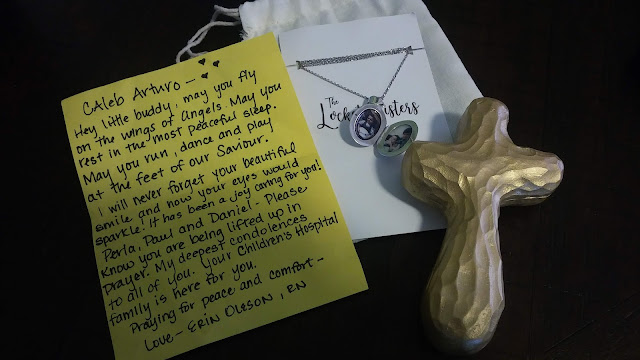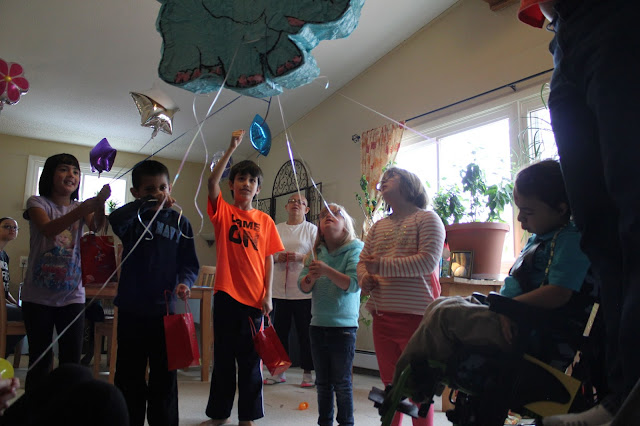Tracing God
"How did you manage? How were you able to face the certainty that someday he would die? Because you knew... How were you able to deal with the pain of his death?"
We hang up and I answered her questions silently and only to myself: "God... He is how." That very moment, I was acknowledging that God was the one to thank for my endurance and survival.
Had my friend asked me months ago, that would not have been the answer to myself nor to anyone else. Months ago, I was still angry at the fact that a mother could survive the death of her child. It felt like a cruel joke that we humans could be so resilient. How was it possible that I would not turn into dust as well? As Anglican pastor and author Tish Harrison Warren points out, "For every mother enraptured by her child's first smile, there is another mother whose [child] struggles for his final breath... In all our lives, from the happiest to the most tragic, the circumstantial evidence for God's goodness is divided. There is beauty and there is horror."1 And my circumstances pointed to an impassive God who didn't care.
I equate my grieving process to that of Job's. I faced my son's last weeks with a certain stoicism. Like Job, I held on to my theoretical understanding of God's role in the chaos of the world in order to gather strength: Crap happens, but someday God will make everything right. Someday, never again will a small child die.2 Yet, it was just a matter of time, as in Job's case, for the ugliness and finality of my son's death to hit me. Then, that hope for a beautiful future failed to bring me comfort. Like Job, I began ranting against God.
As much as I would prefer a miracle be the sign of God's presence and intervention, I have learned that the signs of his presence and his concern for our pain and circumstances can be very plain, ordinary, and easy to miss. The signs which reveal God was/is here can be almost imperceptible to eyes craving for flashy headlines in bold letters. They can seem insignificant to a poor soul hoping for a superhero deity.
I now believe God was with us in that PICU room, even though the room seemed to contain only monitors and medical equipment, a septic child in a hospital bed, and two parents with a shattered heart. Two years after my son's death, I can trace God's presence during the journey of shock and grief. The moments God has felt nearest, when little "miracles" have happened, have been like fireflies in a dark field, popping out here and there. And those, I now see, are the reason I am standing.
A mistaken Bible verse
"Be strong in the Lord, Perla! Matthew 11:28" texted back a bereaved mother from our church after having informed her we were taking Caleb off life support in two days.
"... 'and lo, I am with you always, even unto the end of the world...'3 That means Jesus will be with us the day of Caleb's death."
I mistook my friend's referenced verse for Matthew 28:20, but that is exactly what I needed to know: Jesus would be with us on May 2nd, 2019.
As I have walked through the valley of death, God has used his word to remind me of truths and to challenge me. He has let me lament. He has let me question him. As He did to Job, God answered me. His admonitions to the Sadducees and to the Samaritan woman reached my ears and kept alive my flat-lining hope, "You do not know the power of God... If you knew who I really am..."4
The third day
It is time to leave my son's body behind in that cold hospital room, but to me it is not just a body starting to change colors: he is my son, my beloved son. I am about to leave him alone in room 5434 where he slept, intubated, for three weeks. Then, he will be alone in the hospital morgue located in an unknown area of the basement, and then he will be alone in a refrigerated room in a crematorium. Alone, alone, alone. Guilt and panic fall over me. I should be there. I should be with him! I should be lying next to him like I did many nights before death arrived.
Day one: I wake up in the middle of the night. The room is closing in on me and crushing me. I cannot breathe. I should be with him!
Day two: I wake up. It is still dark, and the air feels heavy. I cannot breathe. I should be with him!
Day three: "Why do you look for the living among the dead?"5 The question pops up in my head the moment I open my eyes. It is the morning. I can breathe, even though my emptiness is bottomless.
God in a cat
"Oh, please, Father, be with my son; take good care of him, my son." I pray for the first time for my dead son, as if accepting he is no longer within my reach. It will now be in God's arms where he sleeps. It should be comforting, but it hurts. I am crying when suddenly our cat, Tajin, leaps on my lap. I remember Aslan taking the shape of a barn cat once in order to comfort a lonely, frightened child. I am a grieving mother. And grief is lonely and frightening.
I was the cat who comforted you among the houses of the dead.6
"Just like I was with Shasta, Perla, I am with you." That night around the Advent candles would not be the only one when Tajín would get on my lap and purr as I sobbed, the rhythmic sound soothing me to peace.
I miss my son. I always will. Joy has not replaced my sadness. I don't think I will ever shout, "Praise God! Caleb is in a better place now!" I wish we had never had to let him go. However, if I have managed to spend the night among the houses of the dead, it is because of God; because the God I thought distant and uncaring made himself palpable through a cat and spoke to me patiently and softly through his word.
There is no satisfying answer to the problem of suffering and to my lament. In all honesty, we do not want an explanation. We want God to do something.7 No, we do not have a satisfying answer, but we have a story.8 We have the story of redemption. We have the story of Jesus setting his tent among us, of Jesus entering our suffering —even when it is self-inflicted— and of Jesus dying and rising from the dead to redeem the whole of creation. We have the story of God making things right, eventually.
For now, I must go back to my starting point, albeit with renewed hope: Crap happens, but someday God will make everything right. Someday, never again will a small child die.
1. Tish Harrison Warren, Prayer in the Night, 28
2. Isaiah 65:20
3. Matthew 28:20
4. Matthew 22:29, John 4:10
5. Luke 24:5
6. C.S. Lewis, The Horse and His Boy
7. Warren, Prayer in the Night, 25-26
8. Warren, Prayer in the Night, 28





Comments
Post a Comment